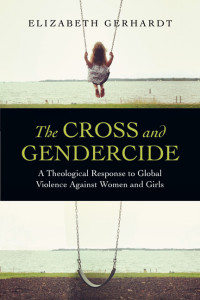 The Cross and Gendercide: A Theological Response to Global Violence Against Women and Girls
The Cross and Gendercide: A Theological Response to Global Violence Against Women and Girls
By Elizabeth Gerhardt
My rating: 4 of 5 stars
There is a war going on that knows no national borders or physical territories. It is a war that occurs in clinics, ritual ceremonies, sweatshops and brothels, college campuses and religious homes. It is a war against half of the planet’s population. It is the war against women. One manifestation of this war is that there is not a woman I know who feels safe walking alone at night. Sometimes the warfare is expressed “merely” in leering looks or harassing comments. But the war is far more serious in many parts of the world.
In some cases, girls do not even have the chance to be born or are killed shortly after birth. Female genital mutilation is practiced in many parts of the world, affecting both sexual intimacy and exposing women to problems with infection and incontinence. Women are trafficked for sex and labor in forced servitude. Rape is used as a tactic of war. And sadly, even in homes of church leaders, women and girls are exposed to physical and psychological abuse and this has too often been justified or covered up by religious leaders.
In the first part of her book, Elizabeth Gerhardt chronicles both the current extent and historical roots in societal, political and religious contexts of the violence against women that scars or takes their lives. What must be faced is the complicity of many churches in this violence, sanctioning cultural rituals like female genital mutilation in some contexts, or in attributing blame to women when they are abused by husbands with no repercussions or discipline toward the husband.
This is not just an advocacy piece however. Gerhardt, as a theologian, believes that the church’s response to violence in various forms against women must be shaped and informed by the central reality of Christian faith-the cross of Christ. In the cross, we see the identification of the Son of God with those who suffer violence. In entering into the suffering of those who have faced such violence, we walk in the way of the Savior who suffered. In understanding that the cross is the Triune God’s just response to human sinfulness and injustice, we are challenged both to repentance and advocacy on behalf of and care for those who suffer injustice and resistance toward the political structures and persons that perpetrate that injustice.
Gerhardt considers Dietrich Bonhoeffer and the Confessing Church in Nazi Germany as a model of this Christ-shaped response to evil. She traces the three-fold response of advocacy, care, and resistance in which the Confessing Church and Bonhoeffer participated and its confessional roots. And she applies this as a model for how the church in various countries may respond today whether in denouncing abusive patterns in marriage, supporting micro-finance efforts that help women experience economic independence that makes them less vulnerable to abuse, or in forms of resistance to corporate or governmentally supported attacks upon women.
My one question in this treatment is what the cross means for the perpetrators of evil against women. Perhaps this book was more or less silent on this issue so as to make unequivocal its advocacy for women and the Christian implications of the cross for them and for the church. But it seems that something needs to be said of both the cross’s implications of judgment against evil and the possibility of repentance, forgiveness and transformation of the worst offenders. This can’t be spoken of lightly in a way that sweeps violence under the rug. It means confession of wrong-doing, legal consequences, restitution where this is possible, and a reformation of life and in the treatment of women.
This consideration aside, Gerhardt’s book is a singular and important contribution to a uniquely Christian response to the global concern of gendercide. So often, Christian activism is not grounded in Christian belief but rather a kind of “us too” response. Hopefully books like this can help galvanize a response in the church that contributes to protecting the lives of women and girls and pushing back the individual and structural forms of oppressive injustice afflicting our mothers, wives, sisters and daughters.
Thank-you to Bob for sharing Review: The Cross and Gendercide: A Theological Response to Global Violence Against Women and Girls from his blog Bob on Books. A difficult and significant topic to address. As a father of four “Little Women” I am very interested in reading this piece by Elizabeth Gerhardt (ThD, Boston University), professor of theology and social ethics at Northeastern Seminary, Rochester, New York, and adjunct professor in the department of religion and humanities at Roberts Wesleyan College, Rochester. I also desire to interview her for this blog. ~ Thomas B. Grosh IV, Associate Director, Emerging Scholars Network
Bob Trube is Associate Director of Faculty Ministry and Director of the Emerging Scholars Network. He blogs on books regularly at bobonbooks.com. He resides in Columbus, Ohio, with Marilyn and enjoys reading, gardening, choral singing, and plein air painting.

Leave a Reply